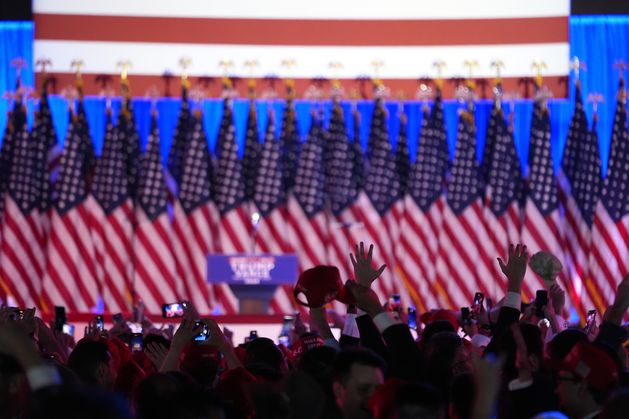The core of Donald Trump’s economic policy has always been ‘America First’ and in a second term in office he’ll been in a position to execute key aspects of that plan including on corporation tax and trade tariffs.
Trump’s key economic policies are trade tariffs, lower domestic taxes, a cut to government spending and an aggressive deregulatory agenda. the first two matter most to us.
Donald Trump has said he will cut the headline US corporation tax rate from 21pc to 20pc and to lower the rate to 15pc for companies that manufacture at home.
Donald Trump claims ‘magnificent victory’ as he looks set for White House return
Cutting the tax rate that US corporations pay in their home jurisdiction will make it more attractive to declare more of their taxable profits and home, and less of it in Ireland and other historically lower taxed jurisdiction.
We know Irish public spending has been floating since 2015 on an unsustainable level of corporate tax collected here from US multinationals. It has been the ultimate free lunch, but the Trump agenda is a direct threat to that bonanza continuing.
Tax reform in the US is notoriously difficult but Trump succeeded in delivering a tax cut in his first term and with Republicans set to dominate in Congress he looks set to pull it off for a second time.
The twist of a lower rate again tied to manufacturing jobs is a bigger threat, ultimately to Ireland’s more substantial foreign direct investment (FDI) model – simply by rewarding US corporations that hire more workers at home than in alternative locations, including here.
From a US perspective it makes sense but, if it happens, it looks like bad news for our economic model.
Historically, US multinationals based factories here to serve their European customers but over the past 15 years that has shifted and big pharmaceutical companies in particular have been exporting goods from Ireland back to the US.
In 2022, Ireland exported goods valued at €63.1bn to the US, compared to €22.2bn we sold to the UK, or nearest and traditionally our biggest trade partner.
And that gets to the crux of Trump’s latest promise.
He wants broad tariffs imposed on exports into the US as a core part of his platform. He has said he will impose a 10pc to 20pc tariff on most imported goods and a levy of 60pc on goods imported from China.
The idea is to protect American jobs by making imported options more expensive. It is a direct threat to our US export trade and is also likely to lead to tit-for-tat responses from policy makers in the US, China and other important US trade partners.
That will be bad for the world economy and Ireland, as a small and open economy, is one of most exposed countries in the world to a roll back of the globalisation that has transformed this country in recent decades.
Unlike tax changes tariffs can be imposed by presidential order and that would have huge implications for FDI and ultimately for jobs.
The US won’t be immune either, but if a Trump’s win is confirmed they at least be getting what they have voted for.
In contrast, Kamala Harris has said she wants to hike corporation tax from 21pc to 28pc – if it happens it would restore some of the attraction of Ireland’s now 15pc tax rate relative to the US.
The Democrats are less hostile to trade, so tariffs are not on her agenda, but if she can squeeze into the White House she will continue the softer deglobalisation that have been put in place under Joe Biden where huge incentives for businesses are now in place to build microchip factories, renewables power generation and ‘green’ industries in the US rather than abroad.
There are still lots of unknowns. It is by no means unusual to see a gap between what politicians say they will do and what they get done in office. With Donald Trump in particular his unpredictability has always been part of the package.
The most radical elements of his agenda could well be watered down in office, but if he locks in a second term based on his economic policy agenda there can be no argument that his ‘America First’ vision lacks a mandate, and inevitably that means Ireland, the EU and America’s traditional trade partners coming a distant second, at best.


